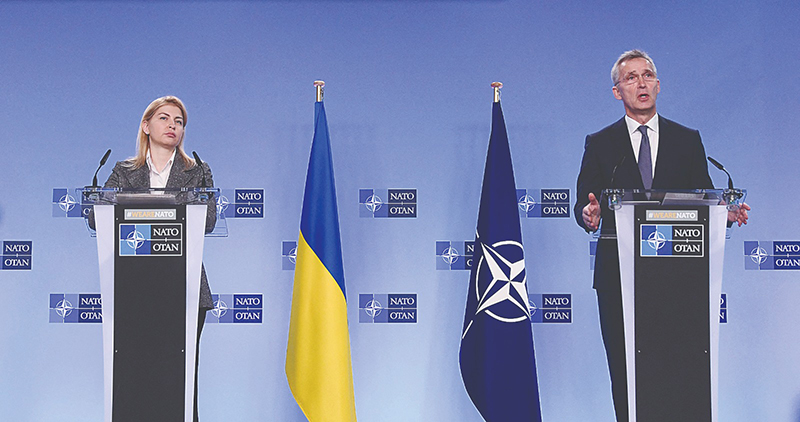GENEVA: Top US and Russian officials held crucial talks yesterday on soaring tensions over Ukraine and security demands from Moscow, with little hope of a diplomatic breakthrough on the table. The high-stakes negotiations come with Russian troops massing on Ukraine's border and fears of an invasion, and Moscow demanding wide-ranging concessions from Washington and its NATO partners.
The talks launch a week of high-stakes diplomacy between Russia and the West, after Moscow amassed tens of thousands of troops at the Ukrainian border, drawing the United States and Europe into a Cold War-style stand-off. US Deputy Secretary of State Wendy Sherman and Russian Deputy Foreign Minister Sergei Ryabkov opened their meeting at the US mission in Geneva at 8:55 am (0755 GMT), officials said.
A convoy of black vehicles with Russian diplomatic plates had arrived shortly before, and was ushered through the large iron gates under a billowing US flag. The two diplomats had already met informally in the Swiss city on Sunday evening, with Ryabkov afterwards telling Russian news agencies the first meeting had been "difficult". Ryabkov was quoted by state news agency RIA Novosti yesterday as saying he feared Washington was not taking seriously Moscow's demand of an end to NATO's eastward expansion.
'Pessimistic forecast'
Pointing to a 2008 promise by NATO to consider membership for Ukraine and Georgia, Ryabkov said: "Are they ready to give legal guarantees that this country, as well as other countries... will not join NATO?"
"I have a rather pessimistic forecast in this regard." Sherman in the talks on Sunday stressed "the freedom of sovereign nations to choose their own alliances," the State Department said. In the muddy trenches on the frontline in Ukraine, where Kyiv's forces have been battling pro-Russian fighters since 2014, there was little hope for diplomacy.
"I doubt that anything will change," 29-year-old soldier Mykhailo said as he walked through trenches in the town of Avdiivka, just north of the separatist stronghold city of Donetsk. "Guarantees of not joining NATO will never stop" Putin, Mykhailo said, adding: "he wants to return the Soviet Union in version 2.0."
Both sides have set firm lines, with Washington warning that Moscow would face severe consequences from an invasion of Ukraine and Russia demanding wide-ranging new security arrangements with the West.
After yesterday's talks, a meeting of the NATO-Russia Council will take place in Brussels on Wednesday, then the permanent council of the Organization for Security and Cooperation in Europe (OSCE) will meet in Vienna on Thursday with Ukraine expected to dominate. US Secretary of State Antony Blinken stressed Sunday that Russia had to choose between dialogue and confrontation, warning on CNN that there would be "massive consequences for Russia if it renews its aggression on Ukraine."
"There's a path of dialogue and diplomacy to try to resolve some of these differences," he said. The United States says many of Moscow's proposals are non-starters. Blinken warned that any positive outcome from the talks would rely in part on Russia's willingness to stand down from its aggressive posture, which he likened to "an atmosphere of escalation with a gun to Ukraine's head".
"If we're actually going to make progress, we're going to have to see de-escalation," US President Joe Biden's top diplomat said. Russia could otherwise face severe economic and financial consequences, "as well as NATO almost certainly having to reinforce its position near Russia as well as continuing to provide assistance to Ukraine", he told ABC television on Sunday.
Putin met Biden in Geneva in June and agreed on regular "stability" talks between Sherman and Ryabkov. Previous rounds were held in the Swiss city in July and September.
US warning
In two phone calls to Putin, Biden has warned of severe consequences if Russia invades Ukraine. Measures under consideration include sanctions on Putin's inner circle, cancelling Russia's controversial Nord Stream 2 pipeline to Germany or, in the most drastic scenario, severing Russia's links to the world's banking system.
Russia insists it was deceived after the Cold War and understood that NATO would not expand eastward. Instead, the US-led alliance welcomed most of the former Warsaw Pact countries and the three Baltic nations that were under Soviet rule.
Russia has put intense pressure on Ukraine since 2014 after a revolution overthrew a government that had sided with the Kremlin against moving closer to Europe. Russia seized the Crimean peninsula and backs an insurgency in eastern Ukraine in which more than 13,000 people have died. - AFP










